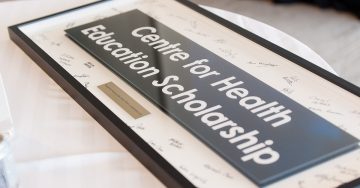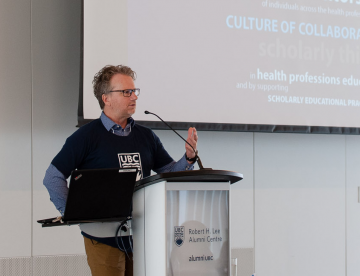As Faculty Development Coordinator and long-time tutor for the Vancouver-Fraser Medical Program, Heather Buckley is one of many people at the UBC Faculty of Medicine who are transforming the health of patients and communities through the education of the next generation of health professionals.

UBC’s Centre for Health Education Scholarship celebrates its 10th anniversary in 2018. Photo: Marlis Funk
When Dr. Buckley wanted to deepen her teaching expertise, she turned to the Centre for Health Education Scholarship (CHES). Since 2008, CHES has been enhancing the health of people and populations by supporting the educational practices of the health professions.
“I had been involved in different aspects of medical education for a long time,” recalls Dr. Buckley, now a Clinical Educator Fellow with CHES, where her research has focused on the role of social networks in faculty development. “I was looking for an opportunity to grow my understanding of the theory behind teaching.”
The work done by CHES members like Dr. Buckley is diverse, covering everything from clinical decision making to assessment to incorporating patient voices into education across the health professions. The learning opportunities are flexible, ranging from drop-in monthly seminars to the two year, full-time formal learning experience of Clinical Educator Fellowship Program.
“In a short span of 10 years, CHES has changed the game for health education and medical education in B.C., in Canada, and in the world,” says Roger Wong, Executive Associate Dean, Education for the UBC Faculty of Medicine. “By applying theory to understanding teaching and learning experiences, the important work of CHES enables the Faculty and the university to translate its health education mission.”
Grounded in educational theory, the research being done at CHES is having a direct impact on how learners in the health professions – from medicine to physiotherapy – are educated and assessed.
A well-known example of this impact is the Multiple-Mini Interview or MMI, a series of short interview stations used in the application process by many health professions programs. Created by Kevin Eva, now an Associate Director and Senior Scientist with CHES, the MMI enables a more accurate understanding of a future health professional’s soft skills, an essential part of delivering patient-centered care.

Director Dr. Ian Scott welcomes participants to the 2018 CHES Celebration of Scholarship on October 3, 2018. Photo: Marlis Funk
“By undertaking work that is shaping the way we educate and assess health professionals, our members are helping to develop exemplary care providers across the health professions,” says Ian Scott, CHES’ Director. “CHES is really at the nexus between health and education.”
In the decade since the Centre was founded, the five CHES Scientists have been cited over 32,000 times and they currently hold over $3.3M in grants, making CHES one of the most productive health professions education research units in the world.
Dr. Scott attributes this productivity to CHES’ focus on collaboration.
“When an educator comes to us with a great idea and asks for our help, we introduce them to others who are working in the same area, which really helps to maximize productivity,” says Dr. Scott. “We have given people a place where they can meet others, where they can collaborate, and where they feel supported.”
This element of networking and peer support has been invaluable for Dr. Buckley, who believes the culture is what sets CHES apart.
“Through CHES, I have met people from all over the world who share my interest in teaching and learning and who have helped broaden my thinking about medical education,” says Dr. Buckley.
“Working with CHES has been a fantastic experience. It’s one of the best things I’ve done.”